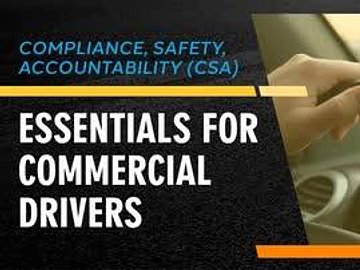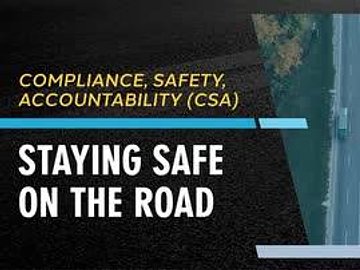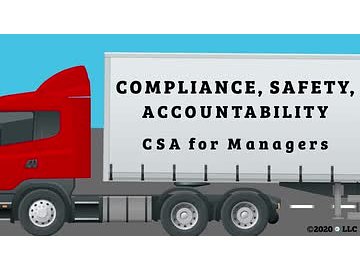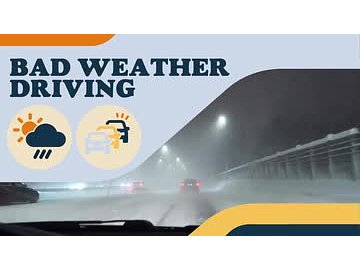DOT Alcohol Abuse: 01. Training Responsibilities for Alcohol Misuse
The U.S. Department of Transportation (DOT) requires that those who supervise employees in safety-sensitive positions receive training around symptoms of alcohol misuse, alcohol testing, and regulations. So, if you’re a supervisor of such employees, this training is for you. In this course, we’ll look at what employees and employers need to know about training responsibilities regarding alcohol misuse and testing within your industry.
DOT Alcohol Abuse: 02. Rules and Regulations for Alcohol Testing
This course outlines the key facets of alcohol misuse testing regulations within the transportation industry, as mandated by the Omnibus Transportation Employee Testing Act of 1991. It covers the scope of impacted individuals, the necessity of establishing testing programs, the creation of formal policies, and the importance of ongoing education and communication.
DOT Alcohol Abuse: 03. Reasonable Suspicion and Post-Accident Testing for Alcohol
Initiating alcohol testing is one of the more uncomfortable tasks associated with being a supervisor of employees in safety-sensitive positions. But in the transportation industry, it's a standard part of the job. As a supervisor, you can alleviate some of the discomfort by knowing the federal rules and regulations regarding testing. In this video, we’ll go over the specifics of reasonable suspicion testing and post-accident testing, to help you understand when you’re required to send an employee for alcohol testing in some of the more challenging circumstances you may face in your role.
DOT Alcohol Abuse: 04. Random, Return-to-Duty, and Follow-Up Testing for Alcohol
As a supervisor working in the transportation industry, it’s critical to understand when you’re required to send an employee for alcohol testing. This course highlights DOT alcohol testing regulations in safety-sensitive positions, focusing on random, return-to-duty, and follow-up testing. It emphasizes the need for fair selection methods, additional steps after violations, and ongoing monitoring for compliance. Explore the importance of effective communication with employees to ensure their understanding and adherence to these regulations.
DOT Alcohol Abuse: 05. How Alcohol Impacts the Brain
The number of deaths associated with alcohol-related motor vehicle accidents is on the rise. In 2021, over 13,000 people in the United States died in accidents that involved alcohol, which is a 14% increase from 2020. The rules and regulations associated with the 1991 Omnibus Transportation Employee Testing Act are designed to prevent your employees from being involved in these accidents. This legislation requires supervisors to receive training about what constitutes alcohol impairment and when to test for it. In this video, we’ll talk more about impairment - specifically, how alcohol impacts the brain. It’s your job to understand the ways in which alcohol can affect different people, so you can decide when to refer one of your employees for testing.
DOT Alcohol Abuse: 06. Signs of Alcohol Impairment
As a supervisor in the transportation industry, it’s your job to understand alcohol impairment. You need to be able to spot the signs of it so you can take the necessary steps to prevent alcohol-influenced driving or other vehicle operation. In this course, we’ll talk through some observable signs of alcohol impairment at different blood alcohol content, or BAC, levels. This information will help guide you when making the decision to request a reasonable suspicion test for an employee.
DOT Alcohol Abuse: 07. Refused or Failed Alcohol Tests
When it comes to managing a DOT alcohol testing program, it’s likely that – at some point – you’ll have an employee refuse alcohol testing. Even more disappointing, you may have an employee fail a test. As you know, the U.S. Department of Transportation (DOT) mandates alcohol testing of all safety-sensitive employees. Every industry under the DOT’s oversight must comply with the testing rules, which include testing if there is reasonable suspicion of alcohol misuse and a random testing program that includes all employees. In this video, you’ll learn more about what it means for an employee to refuse or fail an alcohol test and your obligations as a supervisor.
DOT Alcohol Abuse: 08. Alcohol Testing Procedures
The ins and outs of creating and maintaining an alcohol testing program are extremely complicated and involve very specific testing protocols. It’s up to your facility’s management to ensure that your testing program is compliant with the DOT. It’s also critical for you, as a supervisor, to understand this process. In this video, we’ll cover alcohol testing program procedures. Even if you aren’t conducting testing onsite and refer testing to a different facility, it’s important to know how the tests should be performed.
DOT Alcohol Abuse: 09. Recordkeeping for Alcohol Testing
According to the U.S. Department of Transportation (DOT), your company must maintain records of test results, testing process administration, return-to-duty process administration, employee training, and supervisor training. In this video, we’ll dive into the specifics of recordkeeping related to alcohol testing of transportation employees in safety-sensitive roles. It’s essential that you know these requirements, so you stay in compliance.
DOT Alcohol Abuse: 10. Employee Training for Alcohol Testing
It’s usually mandatory to undergo alcohol testing if you’re in the transportation industry. It’s simply part of the job. Alcohol testing became a requirement in 1991 as part of the Omnibus Transportation Employee Testing Act. It’s part of the U.S. Department of Transportation’s effort to ensure that all transportation providers are drug- and alcohol-free – whether on the road, rails, waterways, or in the air. In this course, we’ll provide a general overview of the DOT alcohol testing rules and procedures required for employees who perform safety-sensitive work.
DOT Drug Abuse: 01. Training Responsibilities for Drug Abuse
This comprehensive course on "Training Responsibilities for Drug Testing" is essential for supervisors in the transportation industry, mandated by the U.S. Department of Transportation (DOT). Covering legislative background, the course outlines policies, procedures, and responsibilities related to drug abuse and testing. Supervisors learn to recognize signs of drug abuse, handle testing situations with professionalism, and respond effectively to positive tests. Emphasizing safety and compliance, the training ensures supervisors understand their role in maintaining a safe workplace and adhering to DOT regulations.
DOT Drug Abuse: 02. Rules and Regulations for Drug Testing
The Omnibus Transportation Employee Testing Act of 1991 established regulations within the transportation industry regarding substance abuse testing. In this course, we outline who is impacted by the legislation, the essential rules and regulations governing drug testing, and the essential components of a company's drug testing policy. Emphasizing communication and education, this course highlights the importance of ongoing compliance to ensure safety for employees, the industry, and the public.
DOT Drug Abuse: 03. Reasonable Suspicion and Post-Accident Drug Testing
Initiating drug testing is one of the more uncomfortable tasks associated with being a supervisor of employees in safety-sensitive positions. But in the transportation industry, it's a standard part of the job. As a supervisor, you can alleviate some of the discomfort by knowing the federal rules and regulations regarding testing. In this video, we’ll go over the specifics of reasonable suspicion testing and post-accident testing to help you understand when you’re required to send an employee for drug testing in some of the more challenging circumstances you may face in your role.
DOT Drug Abuse: 04. Random, Return-to-Duty, and Follow-Up Drug Testing
It’s critical that transportation industry supervisors are equipped with the comprehensive knowledge of drug testing regulations outlined by the U.S. Department of Transportation (DOT). Covering preemployment, random, return-to-duty, and follow-up testing, here supervisors will learn the importance of maintaining a safe work environment through effective testing protocols. From understanding selection methods for random testing to implementing return-to-duty procedures and conducting follow-up testing, this course ensures supervisors are well-prepared to navigate the complexities of drug testing while upholding DOT standards.
DOT Drug Abuse: 05. How Drugs Impact the Brain
The number of deaths associated with drug-related motor vehicle accidents is on the rise. In 2020, over 9,800 people in the United States died in accidents that involved drugs, which is a 7% increase from just four years before. The rules and regulations associated with the 1991 Omnibus Transportation Employee Testing Act are designed to prevent your employees from being involved in these accidents. This legislation requires supervisors to receive training about what constitutes drug impairment and when to test for it. In this video, we’ll talk more about impairment - specifically, how different drugs impact the brain. It’s your job to understand the ways in which drugs can affect different people so you can decide when to refer one of your employees for testing.
DOT Drug Abuse: 06. Signs of Drug Impairment
As a supervisor in the transportation industry, it’s your job to understand drug impairment. You need to be able to spot the signs of it so you can take the necessary steps to prevent drug-influenced driving or other vehicle operation. In this course, we’ll talk through some observable signs of drug impairment for the five different drug types tested by DOT drug tests: marijuana, cocaine, opioids, amphetamines, and PCP. This information will help guide you when making the decision to request a reasonable suspicion test for an employee.
DOT Drug Abuse: 07. Refused or Failed Drug Tests
When it comes to managing a DOT drug testing program, it’s likely that – at some point – you’ll have an employee refuse drug testing. Even more disappointing, you may have an employee fail a drug test. As you probably already know, the U.S. Department of Transportation (DOT) mandates drug testing of all safety-sensitive employees. Every industry under the DOT’s oversight must comply with the testing rules, which include testing if there is reasonable suspicion of drug abuse and a random testing program that includes all employees. In this video, you’ll learn more about what it means for an employee to refuse or fail a drug test and your obligations as a supervisor.
DOT Drug Abuse: 08. Drug Testing Procedures
The ins and outs of creating and maintaining a drug testing program are extremely complicated and involve very specific testing protocols. It’s up to your facility’s management to ensure that your testing program is compliant with the DOT. It’s also critical for you, as a supervisor, to understand this process. In this video, we’ll cover drug testing program procedures. Even if you aren’t conducting testing onsite and refer testing to a different facility, it’s important to know how the tests should be performed.
DOT Drug Abuse: 09. Recordkeeping for Drug Testing
According to the U.S. Department of Transportation (DOT), your company must maintain records of test results, testing process administration, return-to-duty process administration, employee training, and supervisor training. In this video, we’ll dive into the specifics of recordkeeping related to drug testing of transportation employees in safety-sensitive roles. It’s essential that you know these requirements so you can stay in compliance.
DOT Drug Abuse: 10. Employee Training for Drug Testing
It’s usually mandatory to undergo drug testing if you’re in the transportation industry. It’s simply part of the job. Drug testing became a requirement in 1991 as part of the Omnibus Transportation Employee Testing Act. It’s part of the U.S. Department of Transportation’s (DOT) effort to ensure that all transportation providers are drug- and alcohol-free – whether on the road, rails, waterways, or in the air. In this course, we’ll provide a general overview of the DOT drug testing rules and procedures required for employees who perform safety-sensitive work.
Commercial Driver's License: Basic Vehicle Control
The general knowledge section of the commercial driver's license exam includes a thorough assessment of your driving skills. The test will cover everything from how to accelerate to the importance of staying alert behind the wheel. In this program, we'll talk about the basic vehicle control portion of the exam. Before you take the CDL exam, make sure you've thoroughly studied your state's CDL manual - particularly the sections on driving safety. We'll cover the basics here, which should help build a solid foundation, as you begin your studying.
Compliance, Safety, Accountability (CSA): Essentials for Commercial Drivers
The Compliance, Safety, Accountability (CSA) program helps keep roadways safe by monitoring and improving commercial driving performance. You will learn how the Federal Motor Carrier Safety Administration (FMCSA) uses safety data to evaluate carriers and drivers, and why your actions directly affect CSA scores. By understanding your role, you can protect your career, your company, and everyone sharing the road with you.
Compliance, Safety, Accountability (CSA): Staying Safe on the Road
Knowing CSA rules is one thing, but applying them on the road is what keeps you safe. In this course, you will practice steps that reduce violations during pre-trip, on-road, and post-trip activities. You’ll also learn how to prepare for inspections, avoid common BASIC violations, and use safety data as feedback to improve your driving habits and protect your career.
Compliance, Safety, Accountability: CSA for Managers
As a manager, it's imperative that you keep your drivers safe on the road. Quality training is essential to ensure every one of your drivers is competent behind the wheel. Your company's culture should always emphasize safety. In this program, we'll take a more in-depth look at the main elements of CSA and what those mean to your company. We'll take a look at the interventions process and cover the types of interventions and investigations. We'll also go over the Safety Fitness Determination program, how to handle inaccurate records, and third-party entities.
Commercial Driver's License: CDL Overview
Earning a commercial driver's license, or CDL, can be the first step in a rewarding career, and once you obtain your CDL, you'll be eligible to apply for a wide variety of jobs. In this program, we'll talk about how to earn your commercial driver's license, and the tests you'll be required to take. You'll learn about commercial vehicles and licensing requirements. We'll discuss commercial learner's permits, or CLPs, and what those allow, versus what they restrict. We'll also cover CDL endorsements/restrictions and ways that a CDL can be revoked.
Commercial Driver's License: Transporting Cargo
Trucks are one of the most crucial forms of transportation to the American economy. That's because 70% of all freight moved in the United States is carried on trucks. It makes sense then, that part of earning your commercial driver's license is learning how to safely load and transport cargo. In this program, we'll talk about the importance of properly loading your cargo and how to safely secure it. We'll touch on hazardous materials and oversized loads. We'll also go over the cargo inspection process and what you need to know about your gross vehicle weight rating (GVWR) and gross combination weight rating (GCWR).
Commercial Driver's License: Hazardous Driving Conditions
As every motorist knows, driving conditions make all the difference, whether it's driving in the pouring rain, or driving through clear skies and warm weather. As a commercial driver, you've got to know how to operate a larger vehicle in all conditions, no matter what's going on outside. In this course, we'll go over driving at night and the safety checks that requires. We'll talk about driving in fog, and we'll also go over what you need to do when heading into snowy or icy conditions. We'll discuss mountain driving, railroad crossings, equipment failures, and more.
Commercial Driver's License: Transporting Hazardous Materials
Hazardous materials are products that pose a safety risk during transport. As a result, transportation of hazardous materials is highly regulated. Not only do you need to be educated on how to safely move these materials, but you also need an endorsement on your commercial driver's license. In this program, we'll give you a general overview of transporting hazardous materials, including training requirements, shipper/carrier/driver responsibilities, and hazmat labels and placards. We'll also discuss loading and unloading procedures, as well as some critical accident safety protocols.
Commercial Driver's License: Accident and Fire Procedures
As you prepare for your CDL exam, you'll notice that a lot of your education is focused on accident prevention. In this course, we'll talk about what to do if an accident or fire does occur. We'll go over keeping the accident area safe for other motorists and discuss the ABCs of universal first aid. We'll cover vehicle fire procedures, which will include the different classes of fires and how to extinguish them properly.
Commercial Driver's License: Vehicle Inspections
Any time you drive, federal and state laws require you to inspect your vehicle before turning on the ignition. Inspection laws are critically important, because inspectors can put your vehicle out of service if you fail an inspection, so you can bet you'll be tested on this process. You'll also be tested on whether you can determine a vehicle's safety in the field. This skills test is part of your CDL exam. During the assessment, you'll be asked to do a vehicle inspection and to explain to your examiner what you would inspect, and why. This course is designed to get you prepared.
This course provides essential information on the dangers of distracted driving, including the types of distractions, their impact on driving safety, and strategies to stay focused on the road. It aims to help drivers understand the risks associated with distractions and adopt practices to minimize them, ensuring safer driving experiences.
Have you ever been driving along, minding your own business, and someone starts riding your bumper? Or have you ever watched someone drive down an exit lane, bypassing all the backed-up traffic, only to cut back in near the end of the lane? It makes you crazy, doesn't it? These are examples of aggressive driving. Today, we'll talk about what aggressive driving is, why people do it, how to keep yourself from doing it, and what to do when you're confronted with it.
This course provides essential information on driving safely in hazardous weather conditions such as rain, snow, ice, wind, and fog. It covers best practices for handling these conditions, preparing your vehicle, and responding to emergencies to minimize the risk of accidents.


































